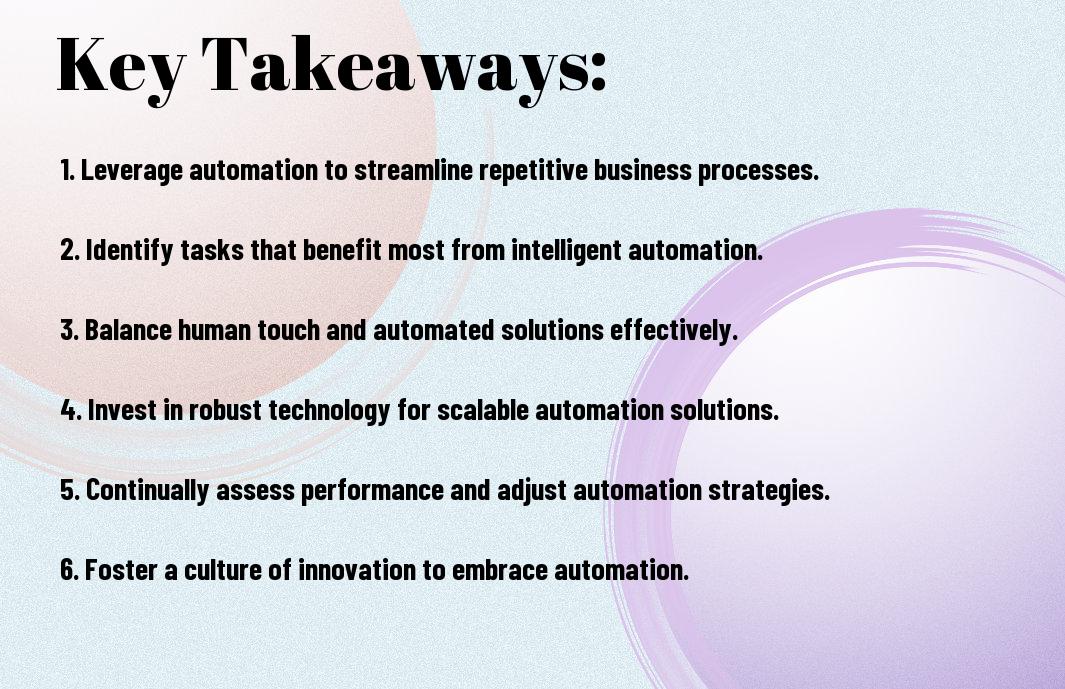As you navigate the challenges of growing your startup, you’re likely looking for ways to increase efficiency and drive growth. Your business is unique, and you need a tailored approach to scale successfully. You’ll discover how intelligent automation can help you streamline processes, reduce costs, and boost productivity, ultimately leading to increased revenue and competitiveness. By leveraging automation, you can take your startup to the next level and achieve your goals.
Key Takeaways:
- Intelligent automation can significantly enhance the efficiency and productivity of startup operations, allowing businesses to scale more rapidly and effectively by streamlining processes and reducing manual labor.
- Implementing intelligent automation requires a strategic approach, including identifying areas where automation can add the most value, selecting the right technologies, and developing a roadmap for implementation and integration.
- Startups can leverage intelligent automation to improve customer experiences through personalized services, enhanced responsiveness, and round-the-clock support, which can be a key differentiator in competitive markets.
- Intelligent automation also offers opportunities for startups to innovate and create new business models, products, and services, driving growth and expansion into new markets and sectors.
- Effective adoption of intelligent automation involves ongoing monitoring and evaluation to ensure that automated systems continue to align with business objectives, adapt to changing conditions, and deliver expected outcomes and return on investment.

The Automation Imperative
The ability to scale your startup efficiently is dependent on your ability to automate tasks. You will need to identify areas where automation can help your business and implement intelligent systems to streamline processes. This will enable you to focus on high-level tasks and drive growth.
Why Startups Must Automate Early
Around the time you launch your startup, you should consider automating tasks to increase productivity. You can automate repetitive tasks, freeing up your time to focus on strategy and growth. This will help you establish a strong foundation for your business.
The Economic Case for Intelligent Systems
Systems that use artificial intelligence and machine learning can help you make data-driven decisions. You can use these systems to analyze your business performance and identify areas for improvement. This will enable you to optimize your operations and increase efficiency.
Automation allows you to take your business to the next level by reducing manual errors and increasing productivity. You can use automation to streamline tasks such as customer service, data entry, and bookkeeping. By automating these tasks, you can focus on high-level tasks such as strategy and growth, and make your business more competitive in the market. You will be able to respond quickly to changes in the market and make informed decisions about your business.
Identifying Automation Opportunities
Clearly, identifying areas where automation can have the greatest impact is imperative for your startup’s growth. You need to assess your operations, pinpointing tasks that are repetitive, time-consuming, or prone to errors, and prioritize them for automation.
Process Mapping for Scalability
Scalably, you should map out your processes to identify bottlenecks and areas where automation can enhance efficiency. You will be able to visualize your workflows and pinpoint opportunities for automation, enabling your startup to scale more effectively.
Low-Hanging Fruit vs. Strategic Automation
To tackle automation, you should differentiate between quick fixes and long-term strategic decisions. You will need to weigh the benefits of automating simple tasks against the potential of transforming your entire business model through strategic automation.
Understanding the difference between low-hanging fruit and strategic automation is key to making informed decisions about your startup’s automation journey. You will be able to prioritize initiatives that drive the most value, whether it’s streamlining everyday tasks or revolutionizing your core operations, and make deliberate choices that align with your overall business goals, allowing your startup to scale intelligently and efficiently.
Technology Selection Framework
Your technology selection framework is crucial for scaling your startup with intelligent automation, as it enables you to evaluate and choose the best solutions for your business needs.
Build vs. Buy Considerations
Any decision to build or buy automation technology depends on your specific requirements, resources, and expertise, and you should weigh the pros and cons of each option carefully.
Integration Requirements
Framework for integration is vital to ensure seamless interaction between different systems and tools, and you should consider your existing infrastructure and potential future needs when selecting automation technology.
Also, when evaluating integration requirements, you should consider the scalability and flexibility of the technology, as well as its ability to integrate with other systems and tools, to ensure that it can adapt to your growing business needs and evolving landscape.
Implementation Roadmap
Keep in mind that a well-planned implementation roadmap is important for scaling your startup with intelligent automation. You will need to consider various factors, including your business goals, existing infrastructure, and potential roadblocks. By doing so, you can ensure a smooth transition and maximize the benefits of automation.
Phased Deployment Strategy
One key aspect of a successful implementation is a phased deployment strategy, which allows you to test and refine your automation solutions before full-scale deployment. You can start by automating a single process or department, and then gradually expand to other areas of your business, allowing you to assess and adjust as needed.
Resource Allocation Principles
Principally, your resource allocation strategy should prioritize areas of high impact and efficiency. You should focus on allocating resources to processes that will yield the greatest returns, and ensure that your team has the necessary skills and support to implement and maintain automation solutions.
It is important to consider your specific business needs and goals when allocating resources for intelligent automation. You should assess your current infrastructure, identify potential bottlenecks, and allocate resources accordingly, ensuring that your automation solutions are tailored to your unique requirements and maximize your return on investment.

Human Capital Optimization
Now that you’re scaling your startup, it’s crucial to optimize your human capital to maximize efficiency and productivity. You need to align your workforce with your automation strategy to achieve your business goals.
Reskilling Your Workforce
Across various industries, you’ll need to upskill your employees to work alongside automation technologies, enabling them to focus on high-value tasks that drive business growth.
Creating Automation Champions
By empowering your team members to take ownership of automation initiatives, you can drive innovation and increase adoption across your organization, leading to improved productivity and efficiency.
Hence, as you create automation champions, you’ll be able to leverage their expertise to identify areas where automation can have the most significant impact, and develop strategies to implement and optimize automation solutions, ultimately driving your business forward and achieving your goals.
Measuring Automation ROI
Unlike manual processes, automation provides you with a clear picture of your return on investment. You can track the efficiency and productivity gains achieved through automation, allowing you to make data-driven decisions to optimize your operations.
Key Performance Indicators
One of the first steps in measuring automation ROI is identifying the key performance indicators that matter most to your business. You will need to determine which metrics to track, such as cost savings, productivity gains, or error reduction, to evaluate the success of your automation efforts.
Iteration Methodologies
About the most effective way to measure automation ROI, you will find that iterative methodologies are crucial. You can refine your approach by continuously monitoring and adjusting your automation strategies to achieve better results.
Indicators such as cycle time, throughput, and defect rate can help you assess the effectiveness of your automation efforts. You can use these metrics to identify areas for improvement and make adjustments to your automation strategies, allowing you to optimize your operations and achieve greater ROI over time. As you continue to refine your approach, you will be able to make more informed decisions about your automation investments and drive greater value for your business.
Summing up
Upon reflecting on the strategies outlined, you now have a comprehensive understanding of how to scale your startup with intelligent automation. You can leverage automation to streamline your operations, enhance efficiency, and drive growth. By implementing these tactics, you will be able to optimize your business processes, making your startup more competitive and increasing your chances of success. Your ability to adapt and innovate will be key to achieving your goals and taking your startup to the next level.
FAQ
Q: What is Intelligent Automation and how can it help my startup scale?
A: Intelligent Automation refers to the use of advanced technologies such as artificial intelligence, machine learning, and robotic process automation to automate business processes. It can help your startup scale by increasing efficiency, reducing costs, and improving productivity. By automating repetitive and mundane tasks, you can free up resources to focus on high-value tasks such as strategy, innovation, and customer engagement. Additionally, Intelligent Automation can help you make data-driven decisions, improve customer experience, and gain a competitive edge in the market.
Q: What are the key benefits of implementing Intelligent Automation in my startup?
A: The key benefits of implementing Intelligent Automation in your startup include increased efficiency and productivity, improved accuracy and quality, enhanced customer experience, and reduced costs. Intelligent Automation can also help you to improve decision-making, reduce the risk of errors, and increase agility and responsiveness to changing market conditions. Furthermore, it can help you to scale your business quickly and efficiently, without having to proportionally increase your workforce. By leveraging Intelligent Automation, you can achieve significant benefits and drive business growth.
Q: How can I get started with implementing Intelligent Automation in my startup, and what are the key steps to ensure a successful implementation?
A: To get started with implementing Intelligent Automation in your startup, you should first identify areas of your business that can be automated, such as data entry, customer service, or bookkeeping. Next, you should assess your current processes and systems to determine where automation can have the greatest impact. You should then select the right automation tools and technologies for your business, and develop a clear implementation plan and timeline. It’s also important to train your staff on the new automated processes and systems, and to monitor and evaluate the effectiveness of the automation implementation. Additionally, you should consider seeking the advice of experts and consultants who have experience with Intelligent Automation implementations to ensure a successful rollout and to minimize potential risks and challenges.



